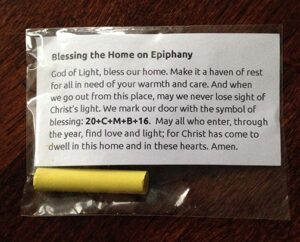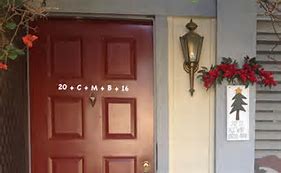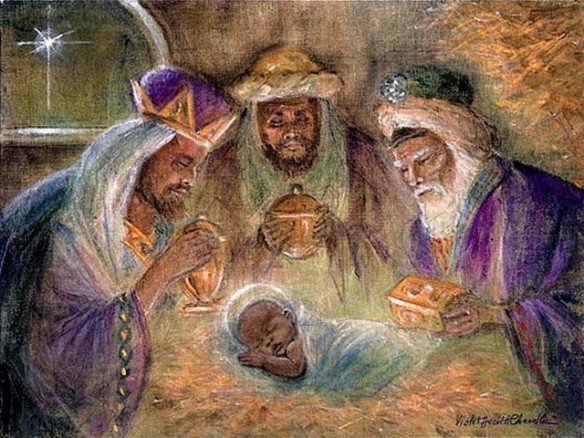 Blessing the House – A Tradition – almost forgotten
Blessing the House – A Tradition – almost forgotten
It is traditional for parish priests to bless chalk for each family so that they may mark the names of the three Magi over their doors, in the blessing of homes as a witness of their faith and protection against evil.
The chalk is a type of memento mori or literally, Memento homo (“Remember, man, you are dust and to dust you will return.”) image, a reminder of the dust of the earth from which man was made. See Genesis 3:19.
Note that any color of chalk is valid for this blessing.
 The feast of manifestation, or Epiphany, is traditionally celebrated the 12th day after Christmas, January 6th. In the dioceses of the United States this feast has been moved to the Sunday between January 2 and January 8.
The feast of manifestation, or Epiphany, is traditionally celebrated the 12th day after Christmas, January 6th. In the dioceses of the United States this feast has been moved to the Sunday between January 2 and January 8.
Each year around the feast of the Epiphany many parishes throughout the world participate in an annual blessing of chalk. It is an ancient tradition that not only places God at the entrance of your home, it places your entire family under his protection.
The blessing has biblical roots, deeply tied to the Passover in the book of Exodus.
The Lord said to Moses and Aaron in the land of Egypt … “take some of the blood [of the lamb], and put it on the two doorposts and the lintel of the houses in which they eat them. They shall eat the flesh that night, roasted; with unleavened bread and bitter herbs they shall eat it … The blood shall be a sign for you, upon the houses where you are; and when I see the blood, I will pass over you, and no plague shall fall upon you to destroy you, when I smite the land of Egypt.” (cf. Exodus 12:1-13)
It is no coincidence that the Epiphany blessing is traditionally written on the lintel of the main doorway and even some of the prayers echo God’s words of protection that he gave to Moses. While the Epiphany blessing was not given in the same manner as it was to Moses, the Church provides it for our own spiritual benefit. The Church desires our salvation and so gives us beautiful sacramentals to assist us along the path to Eternal Life.
Traditionally a priest blesses chalk on the Feast of the Epiphany by saying the following prayer (from the Roman Ritual):
Bless, + O Lord God, this creature, chalk, and let it be a help to mankind. Grant that those who will use it with faith in your most holy name, and with it inscribe on the doors of their homes the names of your saints, Casper, Melchior, and Baltassar, may through their merits and intercession enjoy health in body and protection of soul; through Christ our Lord.
The chalk is then distributed after Mass.
It is a beautiful blessing, one that brings many graces upon those who practice it in faith and is an added protection against any spiritual enemies that may be lurking around.
 The Blessing
The Blessing
Once you acquire the blessed chalk, either a priest or another member of the household can bless the home in the following manner (adapted from the Roman Ritual):
Upon entering the house [or at the front door]:Priest/Head of Household: Peace be to this house.
All: And to all who dwell herein.
Priest: From the east came the Magi to Bethlehem to adore the Lord; and opening their treasures they offered precious gifts: gold for the great King, incense for the true God, and myrrh in symbol of His burial.
All: My soul proclaims the greatness of the Lord,
my spirit rejoices in God my Savior
for he has looked with favor on his lowly servant.
From this day all generations will call me blessed:
the Almighty has done great things for me,
and holy is his Name.
At this point the room is sprinkled with holy water and incensed.
.After the prayers of the blessing are recited, walk through the house and bless each room by sprinkling with Epiphany/holy water and incensing it. Take the blessed chalk and first write the initials of the three Wise Men, connected with Crosses, over the inside of your front door (on the lintel, if possible). Then write the year, breaking up the numbers and the year so that they fall on both sides of the initials. It should look like this, for example20 C+M+B 20with the “20 “being the millennium and century, the “C” standing for the first Wise Man, Caspar, the “M” standing for Melchior, the “B” standing for Balthasar, and the “20” standing for the decade and year. It is also popularly believed that the Kings’ initials stand for “Christus mansionem benedicat” (“Christ bless this house”). 20+C+M+B+21
